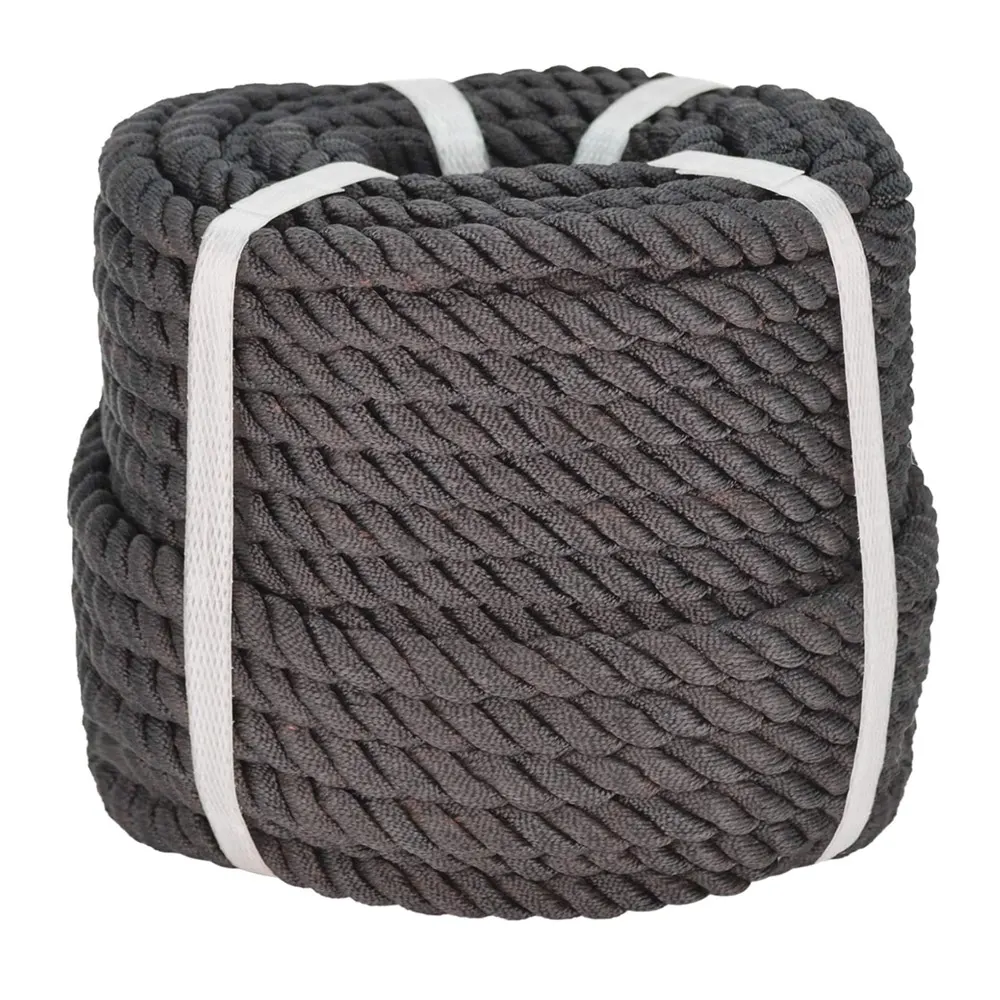








These suggestions are the most easily accessible rope options you’ll find at most home supply and ranch stores. At the bottom of this post you can view: Other Synthetic Ropes and Their Uses


In times of uncertainty, having a well-stocked supply of versatile tools can make all the difference. Synthetic ropes are indispensable in any home supply, especially if there’s a potential for supply chain disruptions. Here, we explore the top three synthetic ropes—Nylon, Polyester, and Polypropylene—and their wide range of recommended uses, why you should stock them, and their invaluable utility during supply shortages.
Also in this post: Differences and Similarities: Nylon, Polyester, and Polypropylene Ropes
Nylon Rope: Strength and Versatility for Every Task
Strength: As one of the strongest synthetic ropes available, Nylon is a powerhouse for heavy-duty tasks. Whether you need to hoist, pull, or secure large items, Nylon rope provides the strength you need.
Elasticity: Nylon’s excellent stretch makes it ideal for absorbing shock loads. This elasticity is particularly useful in applications like climbing or towing, where sudden forces are common.
Durability: Resistant to abrasion and UV rays, Nylon rope stands up to harsh conditions and prolonged exposure to the elements, ensuring a long lifespan.
Versatility: From climbing and boating to general-purpose tasks around the house, Nylon rope’s versatility is unmatched. Its strength and elasticity make it a reliable choice for various scenarios.
Why You Should Stock Nylon Rope in Your Home Supply
Nylon rope is a must-have for preparedness. In emergencies, it can secure loads, create makeshift shelters, or even be used for rescue operations. With its wide range of uses, having a supply of Nylon rope ensures you’re prepared for any task, even if new supplies become scarce.
Polyester Rope: Durable and Reliable for Outdoor Use
Strength and Low Stretch: Polyester rope offers robust strength with minimal stretch, maintaining tension well over time. This makes it ideal for tasks requiring consistent, reliable tension.
Durability: Highly resistant to abrasion, UV rays, and chemicals, Polyester rope is built to withstand tough environments. It’s perfect for both indoor and outdoor use, especially in marine settings.
Applications: Commonly used in marine environments, Polyester rope excels in outdoor activities like camping and hiking due to its robustness and reliability.
Why You Should Stock Polyester Rope in Your Home Supply
Polyester rope is excellent for securing tents, tarps, and other outdoor equipment, making it a must-have for outdoor adventures and emergencies. Its durability and low stretch ensure it remains functional for a long time, providing a reliable resource when replacements are hard to find.
Polypropylene Rope: Lightweight and Floatable for Versatile Use
Lightweight: Easier to handle and transport, Polypropylene rope is a convenient option for everyday tasks. Its lightweight nature makes it user-friendly for people of all ages.
Floating Capability: Unique among the three, Polypropylene rope floats on water, making it ideal for water sports, boating, and rescue operations.
Resistance: Resistant to mildew and chemicals, this rope is suitable for a variety of utility and marine uses, maintaining its integrity in damp or chemically exposed environments.
Why You Should Stock Polypropylene Rope in Your Home Supply
Polypropylene rope is versatile enough for a range of light-duty tasks, from tying down loads to securing items in wet conditions. Its resistance to mildew and chemicals ensures it remains a viable option for various needs, even when new supplies are unavailable.
Differences and Similarities: Nylon, Polyester, and Polypropylene Ropes
Similarities
- Synthetic Composition: All three ropes are made from synthetic materials, offering enhanced durability and resistance compared to natural fiber ropes.
- Durability: Each rope type is known for its long lifespan and resistance to various environmental factors.
- Versatility: All three ropes are versatile and suitable for a wide range of applications, from household tasks to outdoor activities.
- Resistance: They all exhibit good resistance to UV rays and chemicals, making them suitable for prolonged outdoor use.
Differences
Nylon Rope
- Strength: Nylon is the strongest of the three, making it ideal for heavy-duty tasks.
- Elasticity: Has excellent stretch, which helps in absorbing shock loads.
- Water Absorption: Absorbs water, which can reduce strength when wet.
- Abrasion Resistance: High resistance to abrasion, making it durable in rough conditions.
Polyester Rope
- Strength: Strong but not as strong as Nylon.
- Elasticity: Has low stretch, maintaining tension well over time.
- Water Absorption: Does not absorb water, maintaining strength even when wet.
- Abrasion Resistance: Very high resistance to abrasion, UV rays, and chemicals, making it highly durable.
Polypropylene Rope
- Strength: Generally not as strong as Nylon or Polyester.
- Elasticity: Has moderate stretch, providing some shock absorption.
- Water Absorption: Does not absorb water and floats on water, making it ideal for marine applications.
- Abrasion Resistance: Resistant to mildew and chemicals, but less durable than Nylon and Polyester in abrasive conditions.
Summary
- Nylon: Best for strength and elasticity, suitable for heavy-duty and shock-absorbing tasks but absorbs water.
- Polyester: Best for low stretch and high durability, ideal for marine and outdoor use where consistent tension is required.
- Polypropylene: Best for lightweight and floating properties, suitable for water-related activities and tasks requiring chemical resistance.
Honorable Mentions: Other Synthetic Ropes and Their Uses
In addition to Nylon, Polyester, and Polypropylene ropes, several other synthetic ropes are highly valued for their unique properties and specific applications. Here are some honorable mentions:
Kevlar Rope
- Uses: Ideal for applications requiring high tensile strength and heat resistance.
- Applications: Aerospace, military operations, firefighting, and high-temperature environments.
Spectra Rope
- Uses: Known for its high strength-to-weight ratio and minimal stretch.
- Applications: Marine, rescue operations, high-performance sports, and industrial lifting.
HMPE (High Modulus Polyethylene) Rope
- Uses: Comparable to Dyneema and Spectra with excellent strength and lightweight properties.
- Applications: Marine, industrial, rescue operations, and situations requiring ropes that float on water.
Technora Rope
- Uses: Offers high heat resistance and exceptional durability.
- Applications: Firefighting, industrial safety, and environments with high temperatures or chemical exposure.
Aramid Rope
- Uses: Provides excellent heat resistance and strength.
- Applications: Protective clothing, equipment, and applications requiring both high strength and heat resistance.
UHMWPE (Ultra-High-Molecular-Weight Polyethylene) Rope
- Uses: Extremely strong with low stretch and high resistance to abrasion.
- Applications: Climbing, paragliding, marine, and industrial applications where strength and durability are critical.
Dyneema Rope
- Uses: Extremely strong and lightweight with minimal stretch.
- Applications: Sailing, industrial lifting, climbing, and high-performance outdoor activities.
These synthetic ropes offer specialized benefits and are ideal for specific tasks where their unique properties are needed. Having a variety of ropes in your home supply can ensure you’re equipped for a wide range of scenarios, from everyday tasks to emergency situations.
Stocking Nylon, Polyester, and Polypropylene ropes in your home supply ensures you’re prepared for a multitude of tasks and emergencies. Their unique properties—strength, elasticity, durability, lightweight nature, and resistance—make them indispensable tools. In the event of supply chain issues, having these ropes on hand provides peace of mind and readiness for any situation. Don’t wait for a crisis to realize their value; equip your home with these essential synthetic ropes today.
pin it






